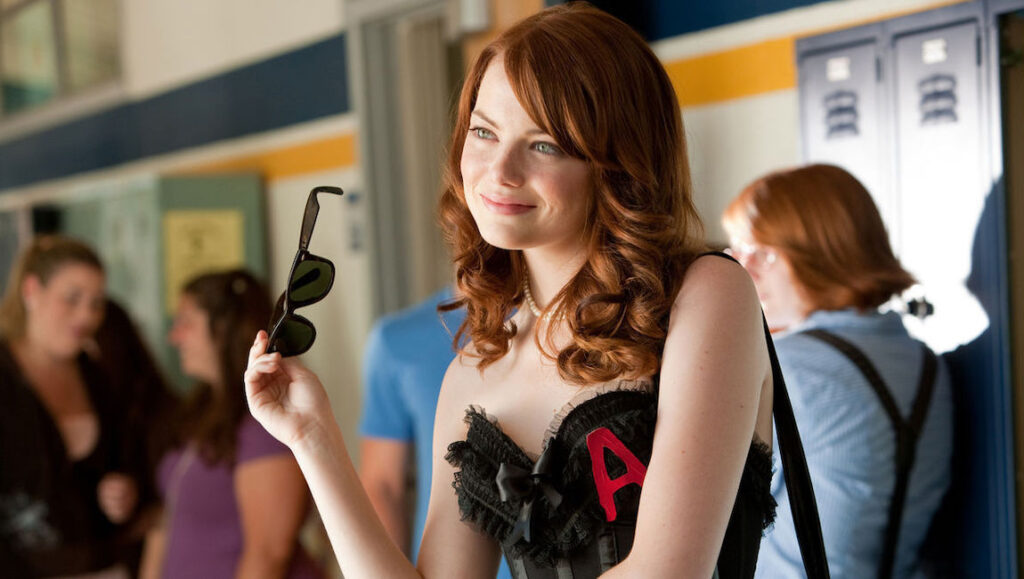As the saying goes, there’s only one thing worse than being a slut: being a virgin. A ludicrous notion if you value your health, but a no-brainer if your social cred is at stake. Olive Pendergast is hardly a sexy name, but her life is all about sex; the sex that she doesn’t have, and the sex that she pretends to have. And even if Emma Stone’s Olive isn’t so preoccupied with losing her “V card,” Easy A is constantly occupied with demonstrating sexual politics through a high school dynamic and its oft-conservative attitude toward promiscuity. Olive herself gets in trouble when she is coaxed by best friend Rhiannon into inventing an imaginary weekend of passion with a non-existent guy. Word gets around that she’s done the deed, attracting the attention of red-blooded males and generating uproar among the school’s Christian branch, led by prim Marianne (Amanda Bynes). Olive fortifies her newfound status as a siren by dressing provocatively and stitching a scarlet “A” (for “Adulteress”) into her outfits, à la the shamed heroine in Nathaniel Hawthorne’s controversial novel The Scarlet Letter. When gay boy Brandon confides he’s being bullied for his sexuality, Olive agrees to ease his troubles by pretending they’ve slept together, exacerbating the impact of her increasingly trampy persona and making life far from “easy.”
Many teen comedies tend to embellish their own stamp on wise-old fables, and while Easy A often feels very fresh in the way that it approaches the issue of promiscuity, it has a distinctly individualist way about it. There isn’t so much of an underlying fear about losing one’s virginity as there is about following a crowd, 21st-century social networking, and Hollywood big-budget remakes satirized as vapid distractions to be scoffed at. Easy A and its heroine are deliciously condescending, which can make for a fun time, but which also results in an army of familiarly narrow-minded examples within its host of high-school subcultures. For every savvy assessment of high-school life, there’s a bloodthirsty Christian, or a horny teacher around the corner, poised to exercise their fickle tendencies in order to provide Olive with a sliver of a further challenge. For each biting, hilarious quip made by Olive’s parents Rosemary and Dill (a typically fabulous Patricia Clarkson and Stanley Tucci), there’s indulgent liberal go-getting to follow. It somehow feels as if the film focuses too much on the characters it wants us to like.
Nevertheless, Stone works wonders in collating Olive’s sassy façade with the quirky, confessional twist to her character — a sort of “Olive Explains It All,” with much cooler parents, and a less annoying little brother. She completely takes hold of the film without resorting to hyperactivity to engage, pulling you so firmly within her perspective to the extent that her humility becomes attuned to a view of Olive as an underdog, even though she never really becomes one. Stone is miraculous in dealing with the latter stages of her arc, especially when reacting to a promising suitor handing her a $200 gift card at the end of their date, with the hope that she will sleep with him. She channels popular depictions of the downfall of the good-time girl by launching into a tearful, neurotic breakdown, becoming her creation for a short while, however far-fetched that seemed from the outset. The niggling doubt about Olive is that Stone plays her with such a knowing sense of superior intellect that you wonder why she cares so much what her “peers” think, or if she does, then why she gets herself into situations that will inevitably lead to severely damaging her reputation. For the most part, Olive is so aware of how the different personalities around her work — from Marianne’s fickle sense of worth, to Rhiannon’s need for inclusion, to school shrink Mrs. Griffith’s self-concerted attitude towards therapy — that it’s somewhat of a stretch to paint her as someone that can dig themselves into this big of a hole.
The film’s gripes about how Facebook, etc. are quelling the creativity of the population don’t prevent Olive from using a similar interface to amend the wrongs of her tattered credibility. She presents the scenario of the film through close-up confession, which definitely introduces energy and anticipation, but when this turns out to be part of the resolution to the narrative, it leaves you a little wanting. Bert V. Royal’s script is a canny instigator of disruption, it can’t quite carry early promise through to a concrete enough final act, tying up every loose end available in all of three sanitized minutes. At the very least, Easy A is one of the more genuine attempts to access the conflicting messages society often projects about when to have sex and how much of it to have, and there are no great political compromises in that regard. What’s unconvincing is the huge gulf in maturity between the two factions of characters, and a lack of middle-ground folks to anchor and richen what the film struggles to say without Miss Stone. It’s difficult to gauge whether the “A” in Easy A most constitutes Adult, Adulteress, or plain-old Attainment. One thing that is for sure is that its formidable starlet is the only component of the film that comes close to achieving top marks.


Comments are closed.